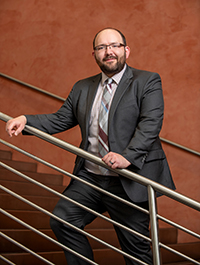Joseph Regalia

What is the most significant issue facing your field and how should it be addressed?
Evolving technologies, regulatory movement, and shifting market forces are thrusting a lot of change on the legal world. Before COVID that was true; now it’s undeniable. Every day, new tools are automating and streamlining more of what lawyers do. We’ve seen bigger investments in legal technology over the past few years than we saw in the decades before that. Clients are demanding efficiency and predictability and transparency in legal work. A growing number of states are even rethinking the monopoly that lawyers hold on running law firms.
In a word: Change. And lots of it.
The best thing to do is embrace it. I’m deeply excited about the power of technology and innovation to transform what’s possible for us lawyers. Technology equips us to do so much more for so many. Automating boring tasks like formatting a document or keeping track of data frees us up to do more interesting and meaningful things that matter. And innovation can help us leap many hurdles that have historically held us back from providing legal help to those who need it most. With these 21st-century tools in hand, we can accomplish things no lawyer could before—redefining our profession and what value we offer the world.
What's the most important thing you are working on right now?
Most of my research and scholarship these days aims at exploring technology and innovation. Right now, the article I’m most excited about offers a framework for developing legal technology skills over time. Rather than focus on the minimum technology competency lawyers must satisfy—the focus of most scholarship in this area—I offer a practical framework for maximizing a lawyer’s effectiveness. This framework is about developing long term strategies to innovate and leverage technology, rather than short term solutions of a quick technology fix.
I’m wrapping up two more articles that I hope will be useful: One explores the value of equipping judges with legal practice data about the matters they handle; the other collects research on crafting more effective legal teams (that I am co-authoring with an industrial-organizational psychologist).
Finally, I’ve been working on a book that I’m really excited about. It brings together research and concrete guidance for developing the major skills that help lawyers thrive these days—like legal writing, presenting, technology savvy, creative problem solving, and more. I’ve been working on it for the last couple of years and can’t wait to finish!
What is it about being a law school professor that inspires or motivates you?
Three things really inspired me this last year. First, our students. No matter what COVID or life threw at them, all I saw was student after student rise to the occasion. Sometimes that meant asking for help when they needed it. Sometimes that meant being there for their peers (or professors). But what I saw again and again was a community fiercely determined to weather this storm—and be better off for it. And how could you not be inspired by folks juggling all the challenges of law school alongside a pandemic?
Second, our legal community and especially our alums. They’ve stepped up for their clients who needed extra help during the pandemic, and they’ve stepped up for our students. A great example is the Virtual Lawyering Bootcamp that Boyd hosted this summer. We had dozens of attorneys—and incredible judges like Judge Jennifer Dorsey— volunteer their time to help our students get ready for their new legal positions.
Finally, I’m always inspired by my own personal community: My family and my circle of friends. I couldn’t do what I do without them. And I’m constantly reminded about how important it is that we foster our relationships, both personal and professional.